- Home
- Nancy Pickard
Bum Steer
Bum Steer Read online
Bum
Steer
Nancy Pickard
A Jenny Cain Mystery
POCKET
This book is a work of fiction. Names, characters, places and incidents are either the product of the author’s imagination or are used fictitiously. Any resemblance to actual events or locales or persons, living or dead, is entirely coincidental.
POCKET BOOKS, a division of Simon & Schuster Inc.
1230 Avenue of the Americas, New York, NY 10020
Copyright © 1990 by Nancy J. Pickard Trust
All rights reserved, including the right to reproduce this book or portions thereof in any form whatsoever.
For information address Pocket Books, 1230 Avenue of the Americas, New York, NY 10020
www.SimonandSchuster.com
POCKET and colophon are registered trademarks of Simon & Schuster Inc.
Printed in the U.S.A.
Quality Printing and Binding by:
Berryville Graphics
P.O. Box 272
Berryville, VA 22611 U.S.A.
ISBN: 1-4165-8383-1
ISBN: 978-1-4165-8383-7
eISBN: 978-1-451-60471-9
Author’s Note
Yes, there really is a Kansas. But there really isn’t a town of Rock Creek in a county named Hood, Kansas, or a hospital called the Kansas City Medical Center.
Acknowledgments
My heartfelt thanks to: Susan Dunlap and Sally Goldenbaum for their encouragement and writerly assistance; Larry King for critiquing the manuscript with a “reader’s” eye; Nancy Short, R.N., for medical advice; Detective Herb Shuey of the Johnson County (Kansas) Sheriff’s Department for police procedure; Kenneth I. Fligg, Jr., for legal advice about Cat’s will; Jude Deveraux for properly landing Jenny’s plane in Albuquerque; Judy Duhl and Edie Gibson for showing me around Winnetka, Illinois; and especially to Jim Link, associate director of the Ranch Management School at Texas Christian University, Fort Worth, Texas. If any errors of fact remain in this manuscript, it’s my fault, not theirs.
Finally, special thanks to my parents, Clint and Mary Wolfe, for raising me in Kansas City, Missouri, to which I have finally, fictionally, come home.
This novel is dedicated, with love and gratitude, to my favorite cattle ranchers: my mother-in-law, Eva Ann Pickard, my father-in-law, Dr. Nicholas S. Pickard, and especially to my husband, Guy Pickard.
PART I
Crazy Little Women
1
You know how the sound of thunder may first reach your ears from a long way off? So far away that it registers only as a rumble in your subconscious? There, for a moment, you felt something, an unease, but what was it? A truck going by on the highway, an airplane overhead? You shake your head, you go back to whatever you were doing. You shrug off the edginess that for an instant crept down your spine. The storm has to get closer and louder before you look up, startled: “Is that thunder I’ve been hearing?”
I didn’t recognize the distant rumble when I heard it.
It came in the form of a long distance phone call on a Thursday, early one October afternoon. If I had glanced out my office window at that instant, would I have seen the cumulus clouds building into thunderheads fifteen hundred miles west of me? If I had opened that window, would I have sensed a change in the weather, smelled rain in the air?
No, of course not. And anyway, I didn’t.
“Port Frederick Civic Foundation,” I answered.
“This is Dwight Brady. I’m calling from Kansas City, Missouri. I’m an attorney with the firm of Brady Buhl Freyer and Levinson.”
I couldn’t remember having ever received a call from anyone for any reason from Kansas City.
“Let me speak to your director.”
His voice had a clipped, arrogant tone to which I immediately took umbrage. I clipped right back at him: “Speaking.”
“Jennifer L. Cain?”
My, aren’t we careful, I thought.
“Yes. What can I do for you, Mr. Brady?”
“Ms. Cain, I am instructed to inform you”—(Clouds building. Distant rumble. Look up, Jenny!)—“that one of my clients wants to make a bequest to your foundation.”
I perked right up at that news. I was delighted to hear that some charitable soul had elected to will us the means to continue doing “good”—and perhaps even better—in our hometown. I thought fleetingly of the print gallery that one of my trustees wanted to fund at the museum. Maybe this new bequest would give us a boost in that direction. Would it be a direct transfer of funds? Five thousand, ten thousand, one hundred thousand? Probably not. Visions of stock certificates danced in my head.
“Well, how nice.” I tried to sound grateful, but not greedy, always a bit tricky in my line of work. Most foundation funds derive from somebody’s death, so it doesn’t do to sound too eager. It is not considered seemly to shout, “Oh, boy, how soon do we get the moola?” Phrasing my curiosity as delicately as possible, I inquired, “Who’s your client?”
“Cat Benet.”
He pronounced it Ben-ay, so it sounded French. The stock certificates atomized into Seurat dots, which whirled into Van Gogh swirls. Impressionist paintings now danced in my head.
“And what is he, or she, leaving to our foundation?”
I pursed my mouth to utter a gracious merci.
“His cattle ranch.”
“I beg your pardon?”
It nearly came out with a French accent: pardon.
“It’s a thirteen-thousand-acre commercial cow/calf operation. Mostly Hereford, some black Angus and black baldies, a few longhorns.”
At heart, I am a city girl. I understood scarcely a word of what this lawyer from Kansas City was saying. He might as well have been talking Chinese. Black angst? Black baldies? Was this some sort of racist slang? Ought I to be offended and to object?
“Where is this ranch, Mr. Brady?”
“In the Flint Hills of Kansas.”
“Kansas?”
“It’s pretty country.”
“I’m sure it is.” If you liked alfalfa. We’d been left some strange bequests before, but this beat them all. A ranch? In Kansas? What had I recently heard given as a standard for poor judgment—oh, yeah—poor judgment was going to Oz and preferring Kansas. “This is Massachusetts, Mr. Brady. We’re a charitable foundation that serves an industrial seacoast town. We wouldn’t recognize a cow if you ground it up and served it tartare. I hate to sound ungrateful, but what in the world are we going to do with a ranch in Kansas? We don’t know anything about farming—”
“Ranching.”
“Okay, we don’t know anything about that, either. Who in heaven’s name is this client of yours?”
“Charles W. Benet IV.”
Now I got it: the name was French, the “Cat” probably being a bastardized pronunciation of quatre, the French word for “four.”
“And who is he?”
“Cat Benet comes from a legendary Texas ranching family,” Brady told me. “At one time, they had an empire of land, cattle, and mineral rights in Texas. He has liquidated those assets, however, and directed the money into trust funds to leave to his heirs. The only ranch he has left is the one you’re getting, the Crossbones, that’s the name of your ranch.”
Our ranch.
“I should tell you, Ms. Cain, the Crossbones Ranch is worth a great deal of money.”
I was still too stunned to be tactful. “How much?”
“Three to four million.”
Omigod. “That’s a lot of cows.”
“Oh, that doesn’t include livestock, equipment, or improvements. That’s just the land. That’s what you might get if you could sell it today.” He paused. “Which you can’t.”
“Why not?” We would want to unload this white elephant
(brown cow?) as quickly as possible and invest the proceeds in nice, quiet, trouble-free Treasury bonds. “Are land prices too low?”
“Well, they are depressed.”
So was I going to be if I got stuck managing a cattle ranch. I had a feeling he was hedging.
“Is there more to it than that, Mr. Brady?”
“Well, the will forbids it.”
“Forbids us from selling the farm?”
“Ranch.”
“Ranch! Why the hell—excuse me—can’t we sell it?”
“Because you have to provide lifetime employment for two of his ranch hands.”
“What?”
“And I suppose I might as well tell you right now that the will forbids the heirs from so much as setting foot on the ranch or interfering with its management. If they disobey, they will forfeit their inheritances.”
I was stuck on: “What?”
“And, to get their money, they’ll have to agree not to contest the will. I’d rather let Mr. Benet explain this to you, himself. I have taken the liberty of making airline and hotel reservations for you this evening—”
“I beg your pardon?”
“—so that you can see Mr. Benet tomorrow.”
“Mr. Brady, that’s not possible.”
“He’s dying, Ms. Cain.”
“I’m sorry to hear that.” I meant it sincerely: the sooner this unknown benefactor died, the sooner we might have a cattle ranch on our incompetent hands. Given the state of American agriculture as I knew it, which admittedly wasn’t well, a farm was no prize even to people who knew how to run one. “What’s the matter with him?”
“Lung cancer, emphysema, liver disease, you name it, he has it. He took a turn for the worse last night. His doctors told him he may not live out the week. That’s why you have to come tonight.”
I removed the receiver from my ear and stared at it in lieu of staring at him: Are you crazy? I was furious at the sheer gall of these people, expecting me to drop everything to fly off to sit at the deathbed of a total stranger. A totally crazy stranger who wrote impossible terms into his will and then tried to place me in charge of them. I put the receiver back to my ear and said, “No, Mr. Brady.”
What I didn’t say was that my husband and I had vacations beginning the next day. I could postpone mine if I had to, but I knew Geof couldn’t change his. The police department, where he is a lieutenant, is not that flexible. We were invited to join friends for a week at sea on their 42-foot Cheoy Lee. No way was I going to Kansas City, instead.
“But what if he dies, Ms. Cain?”
I was annoyed enough to be crass. “Would that cancel the bequest?”
“No, but he needs to explain things to you.”
“I’ll figure it out.”
“But—”
“Write me a letter, explaining everything in great detail,” I said firmly, “and then I’ll see if my trustees will approve a trip.”
“I have already done that.” The arrogance and confidence slid back into his voice. “Your trustees will get their copies this afternoon.”
He refrained from adding: touché.
“You’ll have to go, Jenny.”
That’s what Roy Leland said when he called later that afternoon. Roy is one of my bosses, the new president of the board of five trustees who run the Port Frederick Civic Foundation. He is also the chairman emeritus of United Grocers, a man accustomed to dealing with dock workers and yelling at people over heavy machinery.
“I’ve talked to the other trustees,” Roy said. “We’re unanimous: after reading Brady’s letter, it is clear that this bequest is too large, and the circumstances are too unusual and too critical, to brook any delay.” I had read the same letter, and I could not in good conscience disagree with him. “I’ll get the lawyers to check the legality of the goddamned thing. In the meantime, we want you to get out there and meet this screwball Benet, find out why he picked us, take a look at his ranch. Investigate these two men we’re supposed to employ for the rest of their lives. If that isn’t the most goddamn ridiculous thing I ever heard—”
“Quentin Harlan,” I interjected, “and Carlton Everett.”
“Those two. Find out how the hell we’re supposed to keep Benet’s relatives off the ranch, and why, for Christ’s sake. And Jenny …” Roy softened his tone a bit. “The trustees want you to know that they, uh, we are sorry about your vacation.”
“Thanks, Roy.”
“If it’s any comfort,” he said gruffly, “remember that everything’s up-to-date in Kansas City.”
“Right, if the date is 1950.”
He laughed more heartily than I.
I closed my eyes and watched a Cheoy Lee sail off into the sunset without me. What was that other old song about Kansas City? Something about going to Kansas City, where they had some crazy little women …
And it looked as if I would soon be one.
2
Ms. Cain?”
Dwight Brady, who picked me up at the Kansas City International Airport at eleven-thirty that same Thursday night, was a tall, pale man, slim as a runner, with prematurely thinning blond hair. He looked about my age, which is to say early thirties. Brady wore wire-rimmed glasses, an immaculate pin-striped blue suit, white shirt, blue-and-red-striped tie, black wing-tipped shoes. At eleven-thirty at night. He managed not to raise an eyebrow at my rumpled sweat suit and tennis shoes.
“How was your flight?”
“Long.” I had changed planes in Atlanta. “The airlines seem to believe that the straightest line between two points is a triangle.”
He did not smile; neither did he apologize for the inconvenience he and his client were causing me. He only said, “I’ll take those,” and reached for my briefcase and my carry-on suit bag, which was the only luggage I’d brought. I did not intend to linger in the Midwest—I’d spend tomorrow in Kansas City, the weekend at the ranch, and then I’d take an early flight home on Monday so that I could catch up with my husband and our friends in Provincetown, before they sailed beyond my reach.
“My car’s this way,” Brady said.
In the few short steps it took us to walk from the gate to the curb, we established ourselves on a first-name basis. Dwight. Jenny. Outside, the smell of jet fuel made me feel sick to my stomach. I experienced a moment of intense longing for the salt air at home, and I recalled with resentment the weekend weather report for the entire northeastern seaboard: unseasonably warm and sunny, light winds, calm seas. In Kansas City, it was raining and chilly. I had been carrying a lined trench coat; now I put it on. Swallowing my nausea and disappointment, I stepped into his car while he held the door open.
“You’re staying at the Hyatt Regency, Jenny.”
His car, a late-model, silver Mercedes, was as immaculate as he was, but it had the black-tinted windows I usually associated with south Florida or drug dealers. Or is that redundant? From inside the car, the rainy night seemed even gloomier. Just before closing the door in my face, he said, “I’ll pick you up at eight-thirty in the morning, after you’ve had breakfast at the hotel, and then I’ll take you to KCMC to meet Mr. Benet.”
“KayCeeEmCee?”
“Kansas City Medical Center.”
Slam.
I thought about asking him if he’d like to set my alarm clock. Try to think of him as efficient, rather than arrogant, I suggested to myself as he placed my luggage in the trunk. Right. And try thinking of black as white. Well then, I countered as I heard him close the trunk lid, try thinking of yourself as tired and cranky.
Okay. That was easy.
What was not easy was making conversation with Dwight Brady on the way to the hotel. Every question about Mr. Benet, he deferred to “your own opinion when you meet him tomorrow.” When I asked about the Crossbones Ranch, he said, “I don’t know, I didn’t handle his other business affairs, only the will.” But when I inquired about the odd terms of the will, he said, with the only touch of irony I was ever to hear from him, “You’ll have
to ask Mr. Benet about that, and good luck to you. He is not a man who confides why he does things, he just does them. Or rather, I do what he tells me to do, like writing the will as he dictated it to me. He gives directions, not explanations.”
A lot like his lawyer, I thought.
I finally gave up the effort, leaned back against the seat, and took a deep breath, inhaling the scent of leather upholstery. Right now, I could be snuggled into a berth with my husband, I thought, nuzzling into his neck, smelling his Old Spice. Weariness, horniness for Geof, regret for my days of lost vacation, seeped through my skin, down through my muscles, and deep into my bones, finally settling into a ball of self-pity in my gut. For some reason, I thought of my sister. “Poor Jenny,” she would have mocked me if she had been there at that moment, “poor, poor Jenny.”
The heater had warmed the car sufficiently for me to remove my trench coat, but I kept it wrapped comfortingly around me anyway.
Brady turned the radio on to a soft-rock station.
We drove (and drove and drove) through a monotonous landscape, passing clots of commercial buildings and packs of tract houses. There was no city in sight. Maybe Kansas City is only a figment of a songwriter’s imagination, I mused. That would be a relief. I could go home. But then it appeared: a cluster of skyscrapers rising out of the plains like a three-dimensional cutout in a children’s book.
“This is the Missouri River,” Dwight said as he paid a toll on a bridge called Broadway. “That’s the Kaw River flowing into it from Kansas.” He pointed right. “That’s Kansas City, Kansas, over there.” He jerked his left thumb over his shoulder. “That’s North Kansas City back there. And that’s Kansas City, Missouri, straight ahead of us.”
I hoped there wouldn’t be a pop quiz on this later. It all looked the same to me as the rain washed the cities into a single watercolor painting in dark tones. The lights in the buildings looked like glitter tossed at the canvas.
The city we drove into, Kansas City, Missouri, was surprisingly hilly, even downtown. We drove along a deserted avenue called Grand, which was indeed, where tall, green streetlights glowed eerily in the rain. Dwight pulled into a circle drive in front of a Hyatt hotel with one of those revolving restaurants on top. This was unaccustomed luxury to me. On business trips I usually stayed at modest quarters the foundation could more easily afford. Our benefactor, Cat Benet, was paying for this trip. Through the front doors, I glimpsed a spacious lobby.

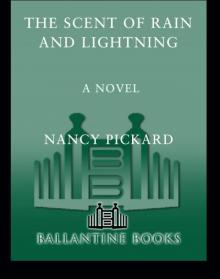 The Scent of Rain and Lightning
The Scent of Rain and Lightning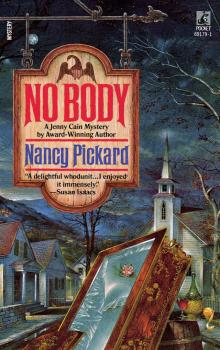 No Body
No Body The Secret Ingredient Murders: A Eugenia Potter Mystery
The Secret Ingredient Murders: A Eugenia Potter Mystery The 27-Ingredient Chili Con Carne Murders: A Eugenia Potter Mystery
The 27-Ingredient Chili Con Carne Murders: A Eugenia Potter Mystery Twilight
Twilight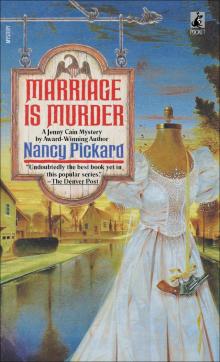 Marriage Is Murder
Marriage Is Murder I.O.U
I.O.U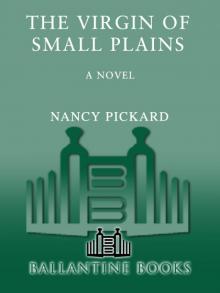 The Virgin of Small Plains
The Virgin of Small Plains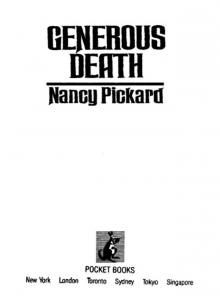 Generous Death
Generous Death The Whole Truth
The Whole Truth The Blue Corn Murders
The Blue Corn Murders Say No to Murder
Say No to Murder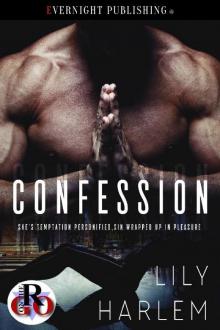 Confession
Confession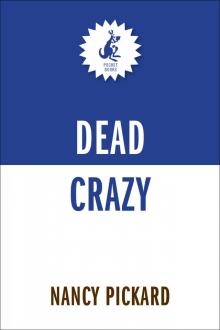 Dead Crazy
Dead Crazy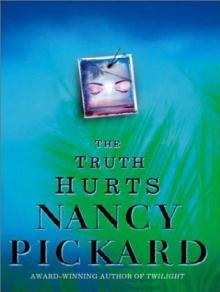 The Truth Hurts
The Truth Hurts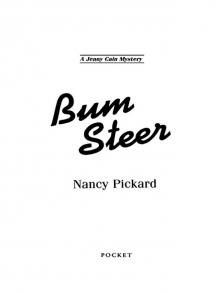 Bum Steer
Bum Steer